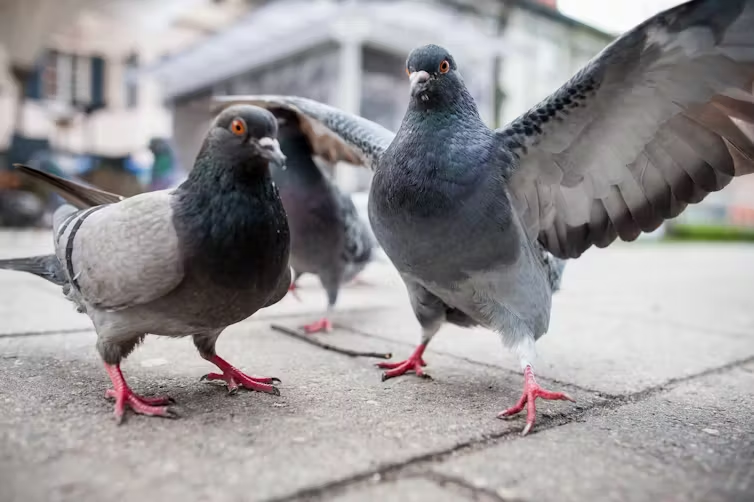Stamp: Bicentenary of the French Revolution (France 1989)
Bicentenary of the French Revolution (France 1989)
01 January (France ) within release French History goes into circulation Stamp Bicentenary of the French Revolution face value 2.20 French franc
| Stamp Bicentenary of the French Revolution in catalogues | |
|---|---|
| Yvert et Tellier: | Yt:FR 2560 |
| Michel: | Mi:FR 2696 |
Stamp is horizontal format.
variety: (a) without signing FOLON (b) light blue (c) dark redStamp Bicentenary of the French Revolution it reflects the thematic directions:
Birds (Aves), a subgroup of Reptiles, are the last living examples of Dinosaurs. They are a group of endothermic vertebrates, characterised by feathers, toothless beaked jaws, the laying of hard-shelled eggs, a high metabolic rate, a four-chambered heart, and a strong yet lightweight skeleton. Birds live worldwide and range in size from the 5 cm (2 in) bee hummingbird to the 2.75 m (9 ft) ostrich. They rank as the class of tetrapods with the most living species, at approximately ten thousand, with more than half of these being passerines, sometimes known as perching birds. Birds are the closest living relatives of crocodilians.
Commemorations are a type of religious observance in the many Churches of the Anglican Communion, including the Church of England. They are the least significant type of observance, the others being Principal Feasts, Principal Holy Days, Festivals, and Lesser Festivals. Whereas Principal Feasts must be celebrated, it is not obligatory to observe Commemorations. They are always attached to a calendar date, and are not observed if they fall on a Sunday, in Holy Week, or in Easter Week. In Common Worship Commemorations are not provided with collects or indications of liturgical colour. However, they may be celebrated as Lesser Festivals if local pastoral conditions suggest it.
Columbidae (/kəˈlʌmbɪdiː/ kə-LUM-bih-dee) is a bird family consisting of doves and pigeons. It is the only family in the order Columbiformes. These are stout-bodied birds with short necks and short slender bills that in some species feature fleshy ceres. They primarily feed on plants, and can be taxonomically divided amongst granivores, that feed mostly on the ground on seeds, and frugivores, that feed mostly on fruits, from branches. The family occurs worldwide, often in close proximity with humans, but the greatest variety is in the Indomalayan and Australasian realms.
The French Revolution was a period of political and societal change in France that began with the Estates General of 1789 and ended with the Coup of 18 Brumaire on 9 November 1799. Many of the revolution's ideas are considered fundamental principles of liberal democracy,and its values remain central to modern French political discourse. It was caused by a combination of social, political, and economic factors which the existing regime proved unable to manage.
Animals are multicellular, eukaryotic organisms of the kingdom Animalia (also called Metazoa). All animals are motile, meaning they can move spontaneously and independently, at some point in their lives. Their body plan eventually becomes fixed as they develop, although some undergo a process of metamorphosis later on in their lives. All animals are heterotrophs: they must ingest other organisms or their products for sustenance.
An anniversary is the date on which an event took place or an institution was founded in a previous year, and may also refer to the commemoration or celebration of that event. For example, the first event is the initial occurrence or, if planned, the inaugural of the event. One year later would be the first anniversary of that event. The word was first used for Catholic feasts to commemorate saints. Most countries celebrate national anniversaries, typically called national days. These could be the date of independence of the nation or the adoption of a new constitution or form of government. The important dates in a sitting monarch's reign may also be commemorated, an event often referred to as a "Jubilee".





